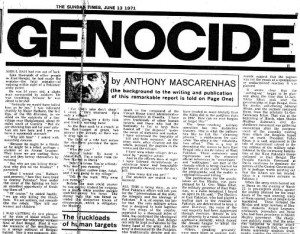DHAKA, Bangladesh — It was a Pakistani journalist, Anthony Mascarenhas, who gave the world the first detailed account of Bangladesh’s war of independence. In April 1971, soon after the army of Pakistan started suppressing the secessionist movement in what was then still the eastern part of the country, it invited Mr. Mascarenhas to report on the conflict, believing he would buttress the false propaganda of a just war. Mr. Mascarenhas promptly moved his family, and then himself, to Britain knowing that soon he would no longer be able to live in Pakistan.

“For six days as I traveled with the officers of the 9th Division headquarters at Comilla I witnessed at close quarters the extent of the killing,” Mr. Mascarenhas wrote in a lengthy, damning report published under the headline “Genocide” in the June 13, 1971, edition of The Sunday Times.
“I saw Hindus, hunted from village to village and door to door, shot off-hand after a cursory ‘short-arm inspection’ showed they were uncircumcised. I have heard the screams of men bludgeoned to death in the compound of the Circuit House (civil administrative headquarters) in Comilla. I have seen truckloads of other human targets and those who had the humanity to try to help them hauled off ‘for disposal’ under the cover of darkness and curfew.”
Four decades later, Mr. Mascarenhas’s government still insists on denying the past: the mass killing of civilians (perhaps as many as three million), the targeting of Hindus, the systematic rape of thousands. On Dec. 16, Pakistan’s National Assembly adopted a resolution expressing concern over the recent execution of Abdul Quader Mollah, a leader of Jamaat-e-Islami, Bangladesh’s leading Islamic party, who was convicted by a Bangladeshi court of committing murder and rape while collaborating with the Pakistani Army during the 1971 war. Calling Mr. Mollah a Pakistani sympathizer — and the independence of Bangladesh “the fall of Dhaka” — a multiparty majority of the assembly complained that Mr. Mollah was sentenced because of his “loyalty to Pakistan” and asked the Bangladeshi government to drop all other cases against the Jamaat leadership.
There is no doubt the Pakistani Army committed war crimes in 1971. Yet in history books and schoolrooms throughout Pakistan, the army’s atrocities are glossed over.
This denial prevails despite an official study by the Pakistani Army. Just after the war, Prime Minister Zulfikar Ali Bhutto set up an independent judicial commission to investigate atrocities committed in East Pakistan in order to understand why the army had failed there. When the Hamoodur Rahman Commission report was published in 1974, it documented how, under the pretense of quashing a rebellion, the Pakistani Army had planned and carried out the execution of intellectuals, soldiers, officials, businessmen and industrialists, and had buried them in mass graves.
The commission recommended that the Pakistani government set up a special court to further investigate misconduct by the army. This never happened, and the report remained classified for nearly three decades. Five Pakistani heads of state have visited Bangladesh since 1971 without extending a formal apology. The closest any of them came to recognizing Pakistan’s wrongs was Pervez Musharraf, who wrote in 2002 in a visitors’ book at a war memorial near Dhaka, “Your brothers and sisters in Pakistan share the pains of the events of 1971. The excesses committed during the unfortunate period are regrettable.”
Bangladesh’s own efforts to deal with its messy birth were unsuccessful — until 2008, when the Awami League was voted into power partly on a mandate to hold a war crimes trial that would bring to justice the people who collaborated with the Pakistani Army in 1971. (By then Bangladeshis had grown weary of successive governments’ turning a blind eye to crimes many of their own families had endured.) The International Crimes Tribunal was created in 2009; 12 men have been charged so far; three of them have been convicted, including Mr. Mollah.
From the outset, the court was dogged with criticism. It has been accused of skirting international procedural standards and of being politically motivated: Most of the accused are members of Jamaat-e-Islami. In December 2012, President Abdullah Gul of Turkey requested “clemency” for the defendants, on the grounds that they were “too old” to stand trial. On the eve of Mr. Mollah’s appeal, Secretary of State John Kerry reportedly warned Prime Minister Sheikh Hasina of Bangladesh that Mr. Mollah’s execution would create instability on the eve of the general election set for Jan. 5.
Whatever one thinks of these trials or the death penalty generally, the sentence against Mr. Mollah was handed down by an independent court in a sovereign country on the basis of extensive eyewitness testimony. And Mr. Mollah’s execution on Dec. 12 had widespread public support. Never mind Prime Minister Hasina’s flaws: At least she has had the political courage to take a stand against whitewashing the past, while the opposition leader, Khaleda Zia, has reinforced her ties with Jamaat by remaining silent on the matter.
But then, a few days after Mr. Mollah’s execution — precisely on the anniversary of Pakistani Army’s surrender to independent Bangladesh — the Pakistani National Assembly adopted its denialist resolution. Instead of supporting Bangladesh’s efforts to come to terms with its brutal birth, Pakistan is pouring salt into its wounds. Pakistan, it is high time you apologize.
Tahmima Anam is a writer and anthropologist, and the author of the novel “A Golden Age.”































